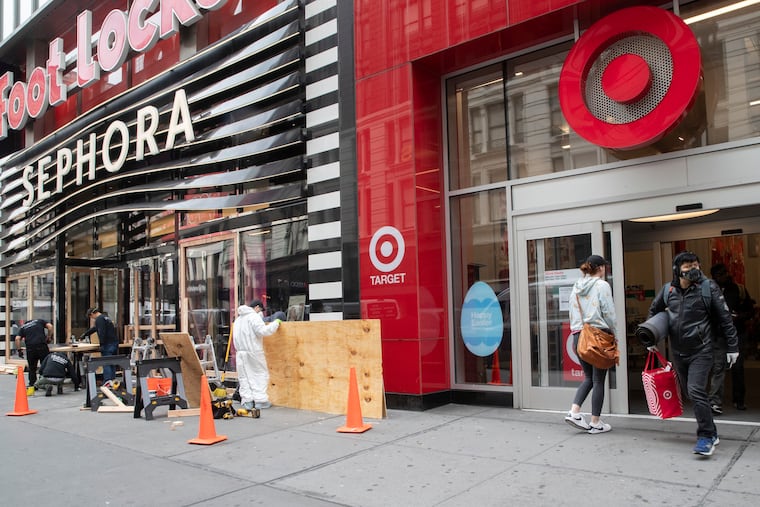Coronavirus doesn’t have to completely upend our economy | Opinion
This is a question of when, not if, we get back to normal.

COVID-19 is shaping up to be a national, if not global, disaster. One need only walk into a supermarket to prove the point. While most of the country isn’t experiencing food shortages, it has become difficult for stores to keep things like toilet paper, bleach, and hand sanitizer on the shelves. In the end, this is more about human psychology than anything else. People are concerned certain products will be in short supply in the future and so are stocking up now, creating shortages.
But there is good news. The productive capacity, labor, resources, and technology exist today as they did before the virus hit. Unlike with a war or natural disaster, today’s economy is capable of producing all the things it did before. Some businesses will close, but by and large their buildings, machinery, even former workers still exist. This is a question of when, not if, we get back to normal.
Where the economy is concerned, there are two varieties of bad news: real and psychological. The former is that people can’t congregate, and that means that businesses that cater to concentrations of people — like restaurants and colleges — have shuttered in full or in part. Many of these businesses will go under, while the rest will return as the danger dissipates.
The psychological bad news is arguably trickier, as it results in a self-fulfilling prophecy of sorts. People expect horrible things to happen under these circumstances. The media feed into this fear by focusing on news that keeps people’s attentions. What tends to keep people’s attentions are things that scare them. Yet, the reality is that all manner of events are unfolding as before. People are marrying, babies are being born, scientists are discovering new things, authors are publishing books. Life is continuing, albeit with adjustments. A healthy dose of caution is in order, but if people become irrationally afraid of what’s in store, that fear will make things worse. Thus the empty store shelves.
» READ MORE: Live updates on coronavirus in the Philly region
A few days after 9/11, President Bush told Americans that the best thing they could do was to go about their business (if with a “heightened sense of awareness”). With his words, he was attempting to short-circuit the self-fulfilling prophecies unfolding then just as they are now. And he was largely successful. 9/11 did change our lives, but the effect on the economy was, in the end, mostly negligible. The economy turned down for one quarter before resuming as before. Though we’ve heard nothing of note from President Donald Trump, given his penchant for hyperbole, that might be for the best.
So what can we expect moving forward? It’s too early to tell to what extent the economy has slowed. If the economy is presently operating at 75% of its usual pace (unemployment claims are up 33%), the economy will grow $15 billion slower than usual on a daily basis. For every 15 days our quasi-quarantine continues, the economy will slow by 1%. For perspective, across the 12 months from January to December 2008, the economy shrank by 2%. Given that under normal circumstances it should have grown by 2%, the 2008 recession shaved 4 percentage points off of the economy. Extrapolating to today, if things remain as they are now for another two months, the economic effect in that short period will be equivalent to the 2008 recession.
In times like this, people naturally look to the government to fix things, but the economy is an incredibly complex and decentralized set of hundreds of millions of relationships. The best thing government can do is facilitate markets rather than attempt to control them. Price controls, popular after natural disasters, are a horrible idea. They encourage consumers to hoard, and discourage entrepreneurs from getting more product to where it’s needed. Suspending mortgage and rent obligations will make housing scarce by removing the incentive to provide housing.
But cutting checks directly to households might be a good idea, because it would leave people to decide for themselves how best to spend the money, while encouraging entrepreneurs to deliver things people want rather than things politicians think they should have.
The best thing any of us can do is to go about our business to the extent that is possible. Some will feel the pain of these circumstances acutely, while for others it will barely register. The only way to get everyone back to normal is to stay within the normal range as much as is possible. This is no small task. But Americans should remember that much of the world lives under this sort of uncertainty on a daily basis. The harder we stare this down now, when things are unpredictable and difficult, the quicker we will recover.
Antony Davies is associate professor of economics at Duquesne University. James R. Harrigan is managing director of the Center for the Philosophy of Freedom at the University of Arizona. They host the weekly podcast, Words & Numbers.